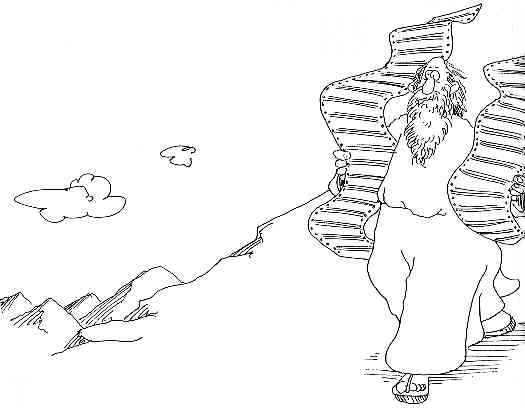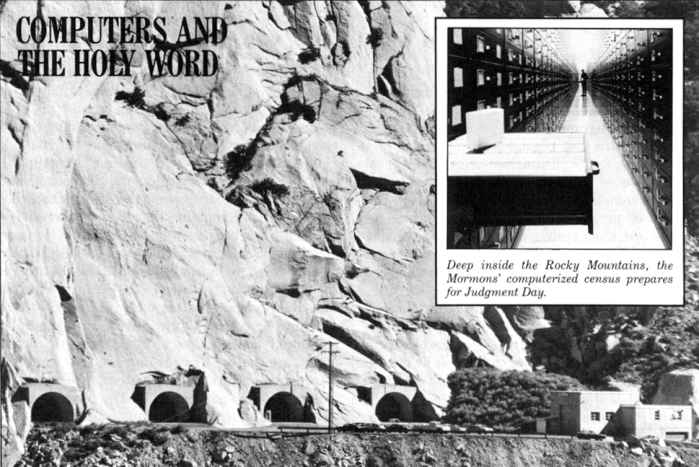COMPUTERS
by Daniel S. Bricklin

Daniel S. Bricklin, chairman of
Software Arts, Inc., together with Robert M. Frankston, invented
VisiCalc: the first electronic spreadsheet program.
Trying to hold a
rational discussion about any aspect of computers with enthusiasts
wrapped up in the subject can be as futile an experience as arguing
theology with a fervent believer. Feelings run surprisingly deep. They
are Right and you are Wrong. Relativism is for fuzzy thinkers and the
unenlightened.
Combined with emotion, beliefs in computer-related
rights and wrongs create distinct schools of thought that at times
resemble religions. There is that same sense of "ultimate solutions,"
the tendency to develop dogmas not open to question, and a feeling of
exclusive community-of "us" against "them."
One of the clearest examples of "religion" in the
computer field has been the rise and fall in popularity of computer
languages. Microcomputer users were ecstatic when they first
encountered BASIC. Some had started with early hobby-kit computers that
used machine language. Now they had BASIC, and it was super-duper.
BASIC was "it." But then they learned that most experienced programmers
believed BASIC was not "it." It did not allow you to do structured
programming; it taught bad habits. So then Pascal was "it." It allowed
some degree of data structuring. But soon objections were voiced: as a
pedagogic language, Pascal has too many restrictions. So the C language
was "it."
While the neophyte personal computer users were
discovering BASIC, programming experts were already using Pascal and C,
but this fact had little impact at first on BASIC's popularity. The
early personal computers were not powerful enough for Pascal and C, and
the users did not seem to mind. BASIC accommodated their needs.
Only in the last few years have many software developers, forgetting
their enthusiasm, relegated BASIC to the dust heap.
The same sort of "religious" commitment comes into
play when programmers consider operating systemstems, the software
that regulates the operation of a computer connected to disk drives or
other external devices. Those of us who worked in the Multics project,
for example, swear by Multics. Yet there is a large body of programmers
fervently dedicated to UNIX, the operating system developed by Bell
Labs. Being religious myself on this point, I am convinced that the
UNIX people just do not fully understand the Multics system.
Some of us can get religious about the "mouse," the
boxlike input device that slides along a desktop to control the display
on a computer screen (the electrical wire "tail" trailing behind it
gave the gadget its name). When I first conceived of VisiCalc, I
thought a mouse/calculator keyboard combination was the best way to go
about it. But there was not such a mouse available, so VisiCalc was
"tuned" for a normal keyboard with arrow keys.
The Apple Lisa folks were even more fervently
committed to the mouse. From the way they talked at first, you never
would have expected to see arrow keys on their computer. But they
wanted to put a spreadsheet on the Lisa, and users are accustomed to
spreadsheets that use arrow keys. Apple had to go against its religion
to give people what they wanted (though the Macintosh offers arrow keys
only on an optional plug-in keypad).
Why do emotional commitments run so high in the
computer field? Ours is an introspective, problem-oriented profession.
We perceive problems and make their solution our goal. Once we have
discovered a solution, we become convinced-at least for the time
being-that we have found the end-all.
That moment of "Eureka!" when all the bits and
pieces fit together is a lot like a religious conversion. We see the
Light, we find the Way. And we are unshakable: that is, until we
discover a new problem. Discoveries come so fast in our field that at
times we may resemble leftover flower children flitting from one
cult-of-the-moment to another.
The public, of course, does not follow us along
every turn of our intricate path, though some of our enthusiasms do
tend to get passed along. There is an aura about the computer field. It
moves so fast and it seems so technologically complicated to the
outsider that it appears mysterious. The average personal computer user
may have no idea how a program works or
why a particular new feature is important. But if it is the latest
advance, the top of the line, and is affordable, that's enough
justification for enthusiasts to go out and buy it.
Of course, we in the personal computer business
capitalize on this aura. That's called marketing. Decisions about which
computer products to buy quite often transcend rational considerations
of product capabilities and user needs. Psychographics come into play,
just as they do in the automobile business.
At least some of the success of the Apple II is due
to the successful creation of a religious mystique. Even kids on the
streets compare their schools on the basis of which computers they use:
"My school is better than yours because we have Apple II." It's a mark
of status. Sometimes you'll hear Apple II owners putting down, for
example, the TRS-80. But there are an awful lot of very satisfied
TRS-80 owners out there.
Real religion has played a vital role in the lives
of many for whom it provides guiding principles, a philosophy and a
source of inner strength. But computers are not the Cosmos, nor are
they even instruments of salvation. Computers are tools, like
screwdrivers or garden rakes. The important considerations are rational
and pragmatic. There are no endalls. There is not necessarily just one
way to approach a problem. Advances in computers will not necessarily
obsolete former alternatives. The religion of computers is often no
more than prejudice and superstition.
| THE 10111'RD PSALM The Computer is my taskmaster; I need not think. He maketh me to write flawless reports He leadeth me with Computer-Aided Instruction He restoreth my jumbled files He guideth me through the program with menus. Yea, though I walk through the valley of the endless GOTO, I will fear no error messages; For thy User's Manual is with me. Thy disk drive and thy Pac-Man-they comfort me. Thou displayest a spreadsheet program before me in the presence of my supervisor. Thou enableth the printout; the floor runneth over (with paper). Surely good jobs and good pay shall follow me All the days of my life; And I shall access your CPUs, forever. (P.S. Please note that 10111 is the binary equivalent of 23.) Revised by CHARLES P. RUBENSTEIN, with apologies to King David |
 Since its inception, the Bible has been the "best seller" of all Western writings and the most copied work of all time. Now the King James Version is available in a computerized edition called The WORD Processor, marketed by Bible Research Systems and created by Bert Brown and Kent Ochel to run on the Apple, TRS-80 and IBM PC microcomputers. Useful in pinpointing specific words and phrases, as well as determining their frequency, the software package of eight double-sided diskettes integrates a word processing and data base program with the text found on an old IBM 360 paper tape used for typesetting the Bible's 4.5 million characters. The computer is also being used by researchers of religion to study Genesis, the first book of the Old Testament, and is an important factor in arriving at the conclusion that this text was indeed written by a single author. And in the area of equal rights an IBM PC is being put to work by the Incarnation Church in Washington, D.C., in the removal of sexist language from prayer books and other religious material and perhaps even from the Bible. In the matter of referring to God Himself, the mysticism of the ages has carried over to modern-day religion. Because Orthodox Judaism holds the divine name in such high regard that there is a prohibition on pronouncing the Tetragrammaton (YHWH, the fourletter Ineffable Personal Name of God), care and wisdom must be exercised in the use of speech synthesis peripherals. More important where the computer is concerned, it is equally forbidden to delete the name of God from a written document. The question of writing on a diskette, whose stored image could be erased in error, might cause concern were it not for the already implemented practice of using words that convey the meaning but not the explicit spelling of God's name. In Utah the LDS Church Library, extending the biblical tradition of census taking, maintains the world's largest genealogical data base inside a half-dozen chambers carved out of the Rocky Mountains. The LDS Library (LDS is shorthand for the Church of Jesus Christ of Latter-Day Saints, also called the Mormon Church) keeps these records for its more than three million current members and their ancestors to allow baptism by proxy and thus assure the entire family of a life in the hereafter. The sheer magnitude of material, over 1.5 billion pages of family trees copied onto over a million rolls of microfilm and containing 60 million family records from 126 different countries, cried out for electronic access and today the index alone of this computerized data bank consists of over 30 million church member records with another 30 million records from nonmembers around the world. Census information dating back to 1890, forty years after the Mormons settled near the valley of Salt Lake City, is also available at the Library and its several branches. For more information on these activities, write to the LDS Library at 50 East North Temple St., Salt Lake City, Utah 84105. CHARLES P. RUBENSTEIN, electronics technology chairman at Bramson Ort Technical Institute and author of The Encyclopedia of Computer Fundamentals |
Return to Table of Contents | Previous Article | Next Article

